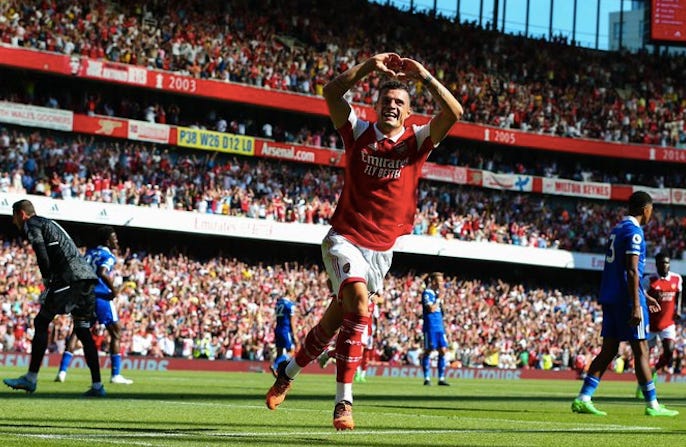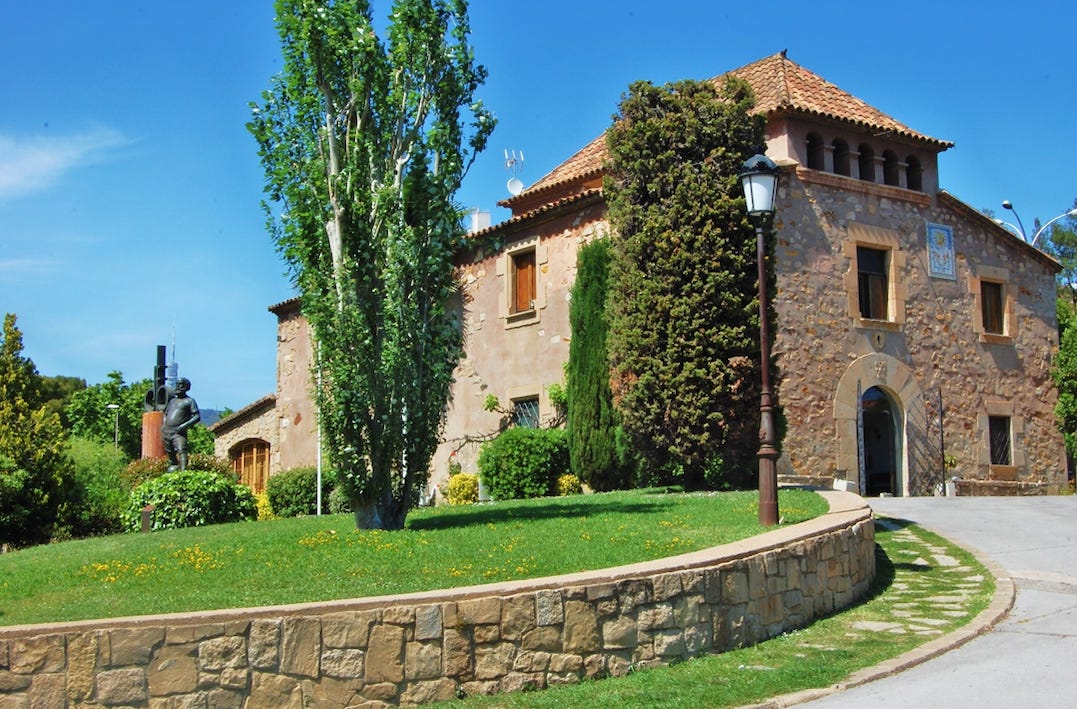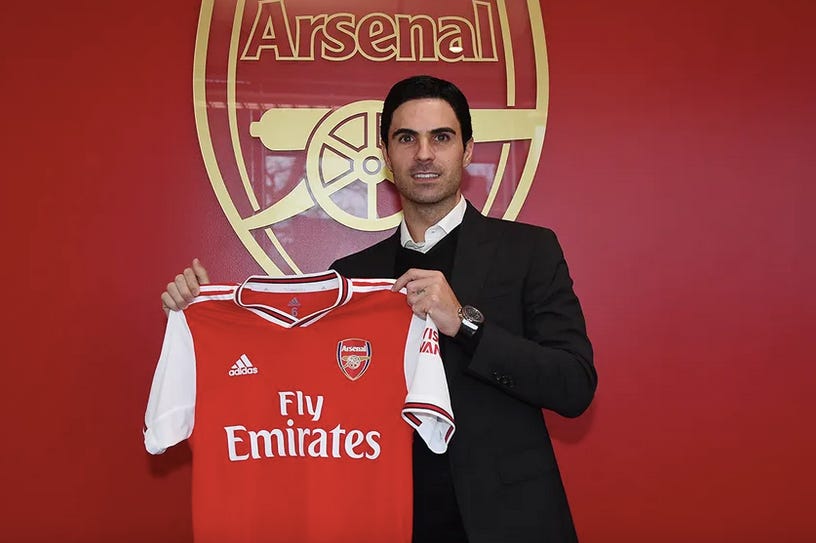The snow came down in a fury and covered everything. An ocean of tumbling crystals heavily falling in fresh waves, so spectacular in their silence, softening the edges and rounding off the world below the frozen storm, with the blue black of all creation twinkling above.
As the dog and I trailed through the city and the copper light of the day disappeared, the illumination from the street lamps each hosted a finite and furious universe, where the pummelling wind tumbled galaxies of snow in great bulbs of luminous mayhem. The dog and I blinked through this string of aurora like two vessels emerging from whence they came before plunging back again.
Those little universes of light got me thinking about how we see the world with our stories, trying to encompass everything but really only illuminating a sliver of the totality. And I started thinking about all these tales of resurrection and redemption being told about Granit Xhaka at the moment. So I thought I’d tell it the Arsenal Wonderland way.
So when we got back I wrote this, and because it’s the international break I thought I’d offer you all a little bit more. So, sit back, relax and enjoy the read.
Part 1 - That Fateful Day
Unai Emery prowled along the touchline, shoulders hunched like a man contemplating the injustices of the world. He was running scenarios through his mind, trying to make clear headed choices in a befuddled world. His team had been two goals up after nine minutes in a London Derby against Crystal Palace that should have been a stroll.
During the previous summer’s transfer window Arsenal had placed a big bet, they’d had bought Pepe, a record signing with a price tag that made the proverbial albatross around the neck seem like a mere fashion accessory. Emery had wanted Palace forward Zaha, but he’d got the winger Pepe. It didn’t matter that the football transfer market had a flimsier logic than even the Art Market, based on nothing more robust than a buyers lust and a sellers greed. Once the fee was paid Pepe needed to play like a masterpiece, instead he played like a work in progress.
Only a couple of months earlier Emery had placed his own bet on a new Arsenal captain. Granit Xhaka was the obvious choice. A natural leader and a man picked to play by every manager he’d ever had. A man with a passion and a fierce will to win. Too fierce some said. A player with an alleged magnetic attraction to controversy and enough red cards to play a hand of Texas Hold’em. But Emery went All-In on Xhaka and he wasn’t bluffing, for Emery Xhaka was a natural captain and would surely lead the team back to winning ways.
As Emery was pacing along the touchline at the Emirates, having lost a two goal lead against this newly installed bogey team (every team seemed a bogey team at the time), he knew he had to go all in and place another bet. He decided to sub off his new captain on 60 minutes after a patchy display in a match that Arsenal desperately needed to win. And with that decision the die was cast. And all Hell broke loose.
Emery had started his tenure so well. Arsenal had lost the first two games of his first season, but the team found their feet and played the next 22 games without losing, winning 11 on the trot, their best run of form for over 10 years. Emery was The Man and Arsenal were heading back to where they belonged. He’d been appointed manager over an ex-player called Mikel Arteta, a man with no experience as a number one, whereas Emery had won the Europa League 4 times, won 6 French cups and won the French league. Arsenal were desperate to fill a mighty big pair of Wenger sized shoes and they bet on a proven cup winner to bring home the silverware. Besides, appointing Arteta would have seemed reckless at a time when the atmosphere around the club was becoming increasingly toxic and a safe pair of hands were needed. This was not a time to be gambling on uncertainties.
But life is more complex than we can ever comprehend, and the simple stories we tell ourselves don’t even begin to explain the true entanglements. On the face of it Emery seemed to be doing well, but beneath the facade of accumulating points he was having real problems. And they went deeper than his strained press conferences. Emery was learning English in front of the worlds cameras and he deserved enormous credit for persevering with his public practice. But his communication with the team seemed equally baffling and as Arsenal began to falter, his Haiku-like command of the language played against him. It didn’t help that he spoke with a timbre of a man who’d been caught by his mortal enemy and was calmly pleading for his life. He was strained and tense and speaking in grammatical riddles.
By the time Arsenal played Crystal Palace on the 27th October 2019, the team was already a patchwork of unraveling discontent, full of players that were straining their relationships with the fans and managed by a man who seemed increasingly at odds with himself. Although Emery had started his Arsenal career with that golden streak, by the time he was hunched on the touchline contemplating the injustices of the world on that fateful day, he looked like a man whose luck had run out.
Arsenal were two up through goals from centre-halves Luis and Sokratis, before Zaha, the man Emery had wanted to buy, produced a stylish piece of theatrical sprawling and was booked for a dive, at which point VAR intervened and instead of the sticking with the booking, Palace was awarded a penalty. Milivojević scored and shortly afterwards Ayew scored again to get Palace on level terms. The Emirates was bubbling like a volcanic mud pit ready to explode and it was at that moment, after months of frustration and confused performances, that the number 34 was held up and Xhaka started to amble from the pitch.
As he slowly made his way to the touchline the volcanic atmosphere bubbled over as a number of fans started booing, which quickly evolved to jeering and Xhaka, never a man to step back from the edge took on 60,000 of his own fans and raised his hands in mock encouragement then cupped his ear to hear more. The volume in the stadium rose in reply. Arsenal were spiraling. The toxicity had reached front page levels and absolutely nobody would come out of this looking good. In a strangely poetic moment, as the defeated and bristling captain threw off his shirt to a chorus of boos a relatively new player by the name of Bukayo Saka ran onto the pitch as if he were trying to escape the horror of it all. It seemed the Arsenal script was being written by comical, spiteful gods.
Part 2 - The Stories We Tell
Let me break the writerly fourth wall here for a moment and mention the wonderful writer Kurt Vonnegut, who once submitted a brilliant (and hilarious) thesis to the University of Chicago about the Shape of Stories (it was rejected according to Vonnegut because “it was so simple and looked like too much fun”). He plotted out the shape of various stories and suggested that they always follow a certain pattern. According to Vonnegut, The Redemption Of Granit Xhaka would fit perfectly into the first of his Story Shapes - Man In A Hole. In his own words Vonnegut says “it needn't be about a man and it needn't be about somebody getting into a hole. Somebody gets into trouble and gets out of it again. People love that story. They never get sick of it.”
We love these stories so much that I wonder what comes first, life or the story? Because when Xhaka walked off the pitch that day and the story was only half told we were only half satisfied. Yes, we’d seen the “getting onto trouble” but we hadn’t seen the “getting out again” which meant Xhaka story had a shape, but it wasn’t the shape we wanted. We needed a dose of redemption. And right now football writers the world over are filling that void with story after story about salvation.
But the thing is, I’m of the mind that these stories, sculpted so carefully out of reality, are missing a vital truth. As David Bohm might have said, they fail to treat the totality of existence as an unbroken whole and instead evaluate a single thread beyond its value, becoming a celebration of fragmentation at the expense of wholeness.
Part 3 - The Monk From La Masia
Way back in 1997, another crucial element of the Resurrection Of Granit Xhaka was taking shape. Although, like with so much that forms the pattern of our lives, there was no way of knowing that when Mikel Arteta was accepted into La Masia as a 15 year old, he’d be embarking on a journey that would have an enormous impact on Xhaka’s life.
Barcelona’s academy has echoes of a monastery. La Masia (Catalan for 'the Farmhouse’) was built in 1702 and has been synonymous with inculcating youth players with the Barcelona philosophy since opening in 1979 (Barca has since moved its academy).
Leaving home and entering La Masia meant entering a mind-scape very similar to that inhabited by monks or philosophers or contemplative thinkers. Arteta immersed himself in the club’s thinking, drenched himself its rituals and codes and philosophy. He became a student, then a practitioner and eventually a teacher. As the years passed, he added to the ideas he’d learnt by taking the core doctrines and translating them to build a footballing philosophy of his own.
On that terrible night when Xhaka and 60,000 furious Arsenal fans began publicly squabbling, Arteta was close to being ready with his own plans. He’d been studying under the tutelage of Man City’s manager (and fellow La Masia alumni) Pep Guardiola and he was looking for a move, a chance to manage in his own right, somewhere to establish his own footballing doctrine.
The time spent in La Masia and with Barcelona, the years as a professional footballer plying his trade across Europe, and the apprenticeship under Pep, one of the worlds most cerebral footballing tinkerers, meant by the time Arteta was appointed as Arsenal Manager in December 2019, he’d formed a very clear idea of his own footballing philosophy and the kind of player that would flourish in his system. Arteta’s men need physical stamina, emotional maturity and mental sharpness. There were players at Arsenal who needed to be moved on. And there were players that needed to be persuaded to stay. Namely, one ex-captain, Granit Xhaka.
On the day Arteta was appointed manager, Xhaka was on the fringes, exiled from the first squad, stripped of the captain’s armband (5 weeks after being appointed) and looking to leave the club in the January window. The jeering was still ringing in is ears as the Monk from La Masia took over at the Emirates in December.
If there’s one key characteristic a manager needs it’s to be able to read human beings. The best managers need to be people people. They need to form teams built of personalities and they need fit those personalities together in an ever evolving jigsaw of human interaction. When Arteta looked at Xhaka he saw he had the skills, the mind and the attitude required to work in his system. Not only as a player but as a person. So Arteta called Xhaka to his office and began to talk. He told him of his plans, his vision, where he wanted to take the club and how he was going to do it and Mikel told Granit he wanted him along for the journey.
Xhaka says of that conversation “I liked his warmth. He was honest, straight. Clear plans. I felt I could trust him. He told me to give him six months to prove me wrong, and then if I still wanted to leave, no problem. Normally I spend a lot of time making these decisions. I talk to everyone around me, I weigh up the pros and cons. But that day I broke my own rules. I told Mikel, ‘O.K.”
The moment Xhaka agreed to be a part of Arteta’s vision, his road to redemption was set. From trying to extinguish fires in a team of arsonists whilst playing in a system that didn’t suit his skill set, Xhaka experienced something extremely rare. The world seemed to reshape itself around him. Arteta got rid of players that didn’t suit his system and brought in the players that did. He changed the way the team played and he opened up a position for Xhaka to play in a different way.
After years of travelling the footballing road Arteta gained the insight to realise that Xhaka and Arsenal needed each other. The very attributes that had brought Xhaka and Arsenal into conflict were the very attributes that would feed into their mutual success. It was the calm contemplation and wise intervention by a footballing monk that began to rebalance the Arsenal Universe.
Part 4 - The Hero
The resurrection of Granit Xhaka isn’t really a story of one man’s journey into trouble and out of it again. It’s really a story about the incredible complexity and interdependence that we humans experience everyday in our unfathomable, interwoven and mutual existences. I think Kurt Vonnegut was onto something beautiful with his Shape of Stories thesis, but he didn’t take it far enough. Every story we tell is but a tiny sliver of the whole. Every narrative a tiny glimpse of the great block of happenings. We don’t shape stories that reflect our lives. We interweave our stories into our lives to try and make sense of that which we can never really understand. And then we allow the stories we tell to become the truth.
So who is the hero of the Granit Xhaka Redemption story? Yes, it’s Xhaka himself for having his unique personality, for being the man he is. Yes, it’s Arteta for having his unique personality, for being the man he is. And maybe it’s even Emery for all the same reasons. But for me, the real hero is the story itself, because it offers us hope. Hope that we too can make amends and conquer our shame or sorrow or pain or regret. Hope that we beautifully flawed humans can overcome our inner demons and go on to be loved again, to love again, to be forgiven and to forgive. Hope that we too can learn and grow. Hope that if we stay true to ourselves then maybe, just maybe, the great pattern of life will one day deliver redemption to our door too.
Granit Xhaka is as happy as he’s ever been in his footballing life right now. At least from one perspective. And long may it continue as he and this young Arsenal team transform under the warm leadership of the Monk of La Masia.
Hope you enjoyed reading this as much as I enjoyed writing it. Have a great week Gunners and don’t forget to subscribe and share the joy of Arsenal Wonderland.












Newsletters very much worth the study ... glad to have come across Arsenal Wonderland through your posts on The Athletic ... now essential reading in my personal Arsenal 101 syllabus (American newcomer here).
Might you add credits for photographers and illustrations/graphics?
What a wonderful and uplifting way to start Tuesday Jonathan! A great redemption arc too, for the player, the manager and us fans.
Also what’s with the new thumb to nose celebration? Baffled. Haha